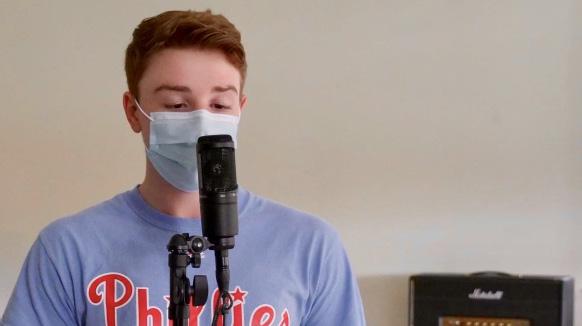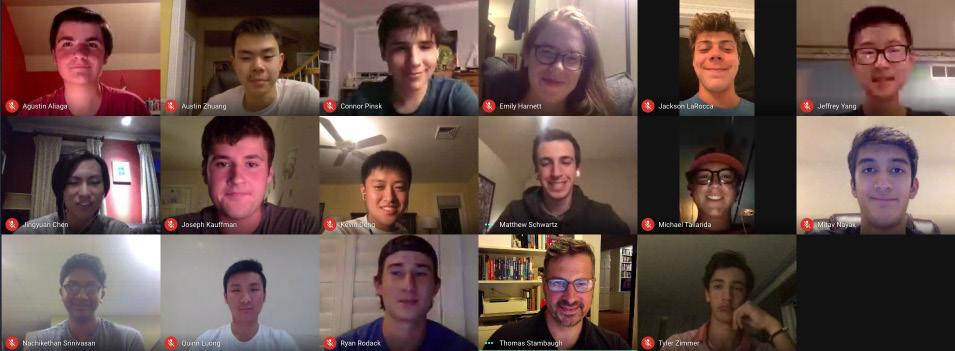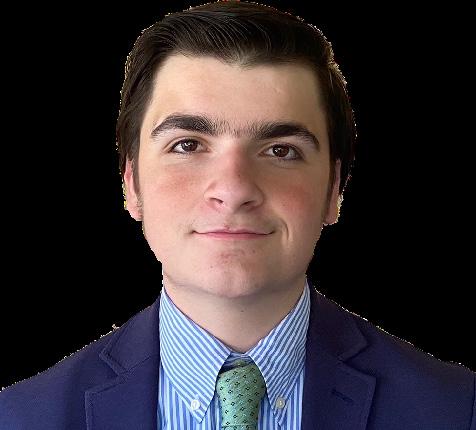the index · academics
Page 10
September 2020
academics Extracurriculars prepare for extraordinary year “I’m a big football guy,” Fourth Former Harvey Pennington said. “I started fantasy football five years ago because I know a lot of people who like football also like fantasy. They had fantasy football at Haverford a few years ago but then they kind of stopped. So I said ‘You know what, I’m gonna start this club.’” Pennington started the Fantasy Football
THE INDEX
The Index staff meets virtually on August 30, 2020 Jingyuan Chen ’23
T
This September, the school year begins with some unprecedented adjustments. The pandemic remains an obstacle in the school’s reopening process. With health and safety in consideration, the school has determined an appropriate academic calendar for the year. Still, curiosity continues to grow over the fate of extracurricular programs. “We are still trying to figure out how some of the programs are going to look, so we’re in the works of trying to figure that out,” Dean of Students Mr. Luqman Kolade said. In the meantime, major club organizations have already started their planning for the year. “We are still trying to see what would be best for the majority of members that we have in the Haligoluk, and when it will fit their schedules,” yearbook advisor Ms. Kristin Brown said. “We will still be meeting. There still will be a yearbook. We will be missing our breakfast sandwiches, which I think are everyone’s favorite thing about yearbook meetings.” Unfortunately, clubs will have to make some accommodations to suit the new vir-
tual environment. Speech and Debate coadvisor Mr. Javier Lluch said, “The most fun parts of debating are going to the national tournament and going to the hotels. The Thursday night practices were also really fun. But all of that is going to look and feel very different.”
The yearbook will be making adjustments to improve its attractiveness. Mr. Lluch suggested that this can be very difficult for recruitment. “What I want to put in the captain’s mind is recruitment,” Mr. Lluch said. “I think that’s going to be a really tough one this year.” Ms. Brown agrees. “I don’t think we had any freshmen on the yearbook last year. Hopefully, we will be able to capture some freshmen this year and interest them in getting a really nice look at a very historic year. This has never happened before in Haverford
history and we’re going to be documenting this in a book that will be around in the archives,” Ms. Brown said. In order to attract new members and maintain community activities, the yearbook will be making adjustments to improve its attractiveness. “Our new thing is going to be that every student who purchases a yearbook, along with all the seniors, get two free pages to customize themselves so they can put photographs of their year in the yearbook,” Ms. Brown said. The speech and debate team has some new plans as well. “A couple of the coaches have a really good idea of setting up scrimmages between the schools. So we would all have a place where we would post our availability and what teams we had,” Mr. Lluch explained. “If those local tournaments don’t happen due to the pandemic, I think we’re gonna take matters into our own hands and try to make it happen.” Aside from clubs that the school is familiar with, students also started new clubs to build connections and combat exhaustion and boredom.
“This has never happened before in Haverford history and we’re going to be documenting this in a book that will be around in the archives” MS. KRISTIN BROWN League at the end of this summer and has begun recruiting. “We got twelve people so far, which is perfect for a league. We got a few ninth graders. And we got all age ranges from new guys to seniors, which was cool,” Pennington said. “Everyone is kind of into it.” While many decisions and changes are happening in progress, the school certainly encourages community-building under the primary condition of ensuring a safe school campus. “The biggest part is getting everyone together in a space, whether that be virtual or physical. We can’t do the physical spacing, so we got to figure out how we can do a virtual one,” Mr. Kolade said. “The school wants to try and provide as many opportunities for you guys to engage with each other as possible. We want to do that. It’s just a matter of how we can do that. We’re figuring that out.”
Opinions vary on school in session Connor Pinsk ’23
W
ith a pandemic attacking the globe, Haverford is adjusting its curricula and reorganizing the way things are done. No coats and ties to reduce the spread; temperature-checks every morning; answering questions about our health on a daily basis. All students who have decided to return this fall will have to comply. All of this poses the question: what will happen to the students who decide to stay home? There really is no answer yet, because we are not nearly far enough in the year to see if there is a drastic difference in the learning environment. The concern is that students who stay home will fall behind because the education style is so different. Not only is virtual learning different from in-person learning, but it is also different from the online learning that Haverford went through in the spring. As we dive headfirst into the first quarter, about 35 upper school students will stay home. These students will attend online classes, which will consist of a live stream of the in-person lessons. The teachers will have to take both online and in-person students into account and make sure everyone is
learning at the same speed. “I am fortunate enough that my parents can drive me and that I don’t have to use public transportation so that I can get to school easily,” Fourth Former Joey Kauffman said. According to the Pennsylvania Department of Transportation, there is still public transport, but it is limited as a part of Pennsylvania’s response to COVID-19. Even though transit is still up and running, buses and trains are enclosed spaces that house many people, so even with masks, some people may not feel comfortable or safe using these modes of transportation to get to school. Kauffman went on to say that the decision to go back to school was “pretty much up to my parents.” Even though this was a decision that Kauffman agreed with, some students might not agree with their parents, which may lead to a bad learning experience. Kauffman said, “A lot of the things that made online school harder were the technical difficulties.” In some class periods, time was wasted due to poor connection or audio malfunctions. These problems may be just as preva-
lent this fall. “I think that it will be easier for people to fall behind if they are doing virtual school, but it is possible for everyone doing virtual
A socially distanced classroom
school to stay up to the level of in-school students,” said Kauffman. con’t on p. 11
MR. THOMAS STAMBAUGH




